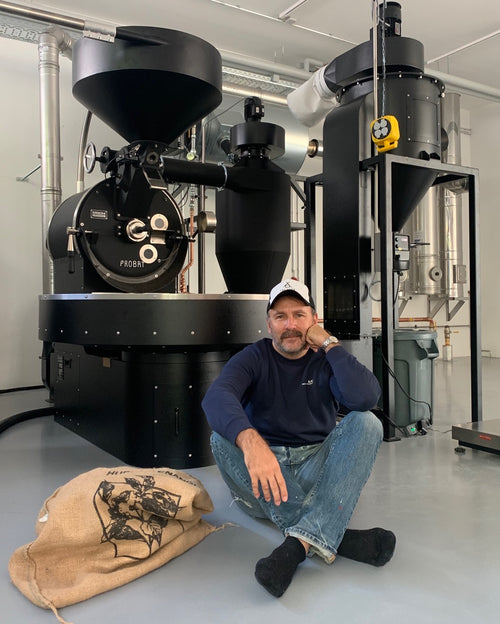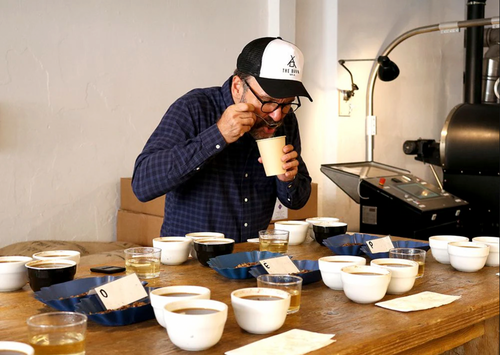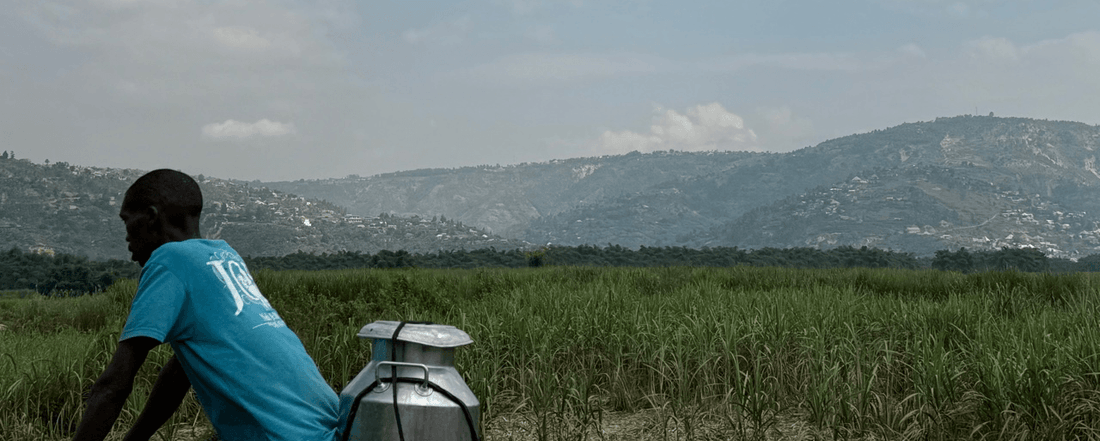Foreword by our founder, Ralf Rueller
Coming back to Rwanda after several years has been an emotional journey. Meeting our coffee producers was a joy and seeing how they have sustained during the uncertainties of Covid, and being exposed to climate change, inflation and labour shortages, just to name some of the key challenges many of our farm partners are facing these days.
How do you stay focused on quality, and put in extra efforts and labour force, when there is a residual risk of not finding a buyer that contracts the coffees above market rate? And how do you not give up when earlier this year, a whole region in Rwanda had a day of hail and storm that destroyed a large portion of cherries hanging on the trees, waiting to be picked? This is when we know that we are on the right path. Close relationships and being a committed partner is what creates the strong fundament of our work.


We are honored to work so closely with fantastic humans and coffee experts. Taking our field trip with John, a walking Wikipedia for anything related to agriculture and coffee production, we have learned so much in just a few days. As an example, John figured out quickly that Mahembe needs more support. They have been underfeeding their plants, which means: they could produce 2-3x as much coffee with their existing plants, if they were in better condition. Also soil analysis is important. There are signs in nature, specific plants growing, that point to over-souring.
It became clear that the support, expert advise, finance and access is important on this triangle between farmer, exporter and roaster. Our partner in Rwanda, export company Rwanda Trading Company (RTC), is doing exactly that. And they are an all-important link to “clean up” the parchment beans (sorting, sorting, sorting, removing, removing, removing) to delivery the stunning qualities we receive in our Rwandan coffees. All our beans undergo a final optical sorting, where each bean is being photographed 3x times at high speed. To sort out the last chance of having anything substandard in our deliveries. Mind you: From 10 kgs of cherries picked from the tree, we receive 1 kg of exportable green bean quality, scoring 86 points and up.
Please enjoy our wonderful coffees from Rwanda!
Field Report by our Roaster, Germán Fasanella
My trip to Rwanda was an unforgettable adventure centered around the fascinating world of coffee. During my stay, I visited three iconic farms: Mahembe, Gitwe, and Huye Mountain. Each of these farms offered me a unique perspective on coffee production, its challenges, and its wonders. My goal was to deeply understand the cultivation and production process, as well as to meet the people who make it possible for us to enjoy a cup of high-quality coffee.
General Description of Rwanda
Rwanda, known as the "land of a thousand hills," is a landlocked country located in Central and East Africa. Its temperate climate and mountainous geography create ideal conditions for growing coffee. Coffee is one of Rwanda's main exports, playing a crucial role in the country's economy by providing employment and livelihoods for thousands of rural families.

Mahembe
- Location and Size: Mahembe farm is located in the western region of Rwanda, in the Nyamasheke district. This farm is situated at an altitude between 1,750 and 2,000 meters above sea level, providing a cool climate ideal for coffee cultivation.
- Cultivation and Harvesting Methods: Mahembe is known for its sustainable agricultural practices and focus on producing specialty coffee. The farm uses traditional cultivation methods combined with modern processing techniques. The beans are handpicked, ensuring that only ripe beans are collected.
- Personal Impressions and Highlights: What impressed me most about Mahembe was the passion and commitment to the quality of the beans. The farm is run by Justin Musabyiama, who has worked tirelessly to improve coffee quality and production. During my visit, I was able to closely observe the fermentation and drying process of the beans, which allowed me to appreciate the dedication behind each stage of production.
- Interactions with Workers and Owners: I had the opportunity to talk with Justin and some of the workers, who shared their experiences and challenges in the coffee industry. Their hospitality and dedication were inspiring.
Gitwe
- Location and Size: Gitwe is located in the Nyamasheke region, not far from Mahembe. The farm is situated at a similar altitude, allowing for the production of high-quality coffee.
- Cultivation and Harvesting Methods: Gitwe farm employs agricultural techniques that focus on sustainability and coffee quality. The beans are grown in natural shade and handpicked. The fermentation process is carefully managed to highlight the unique characteristics of the beans.
- Personal Impressions and Highlights: Gitwe stands out for its commitment to community and sustainability. The farm is involved in several social projects that benefit the workers and their families. The quality of the coffee produced here is exceptional, with a complex and balanced flavor that reflects the care taken in its production.
- Interactions with Workers and Owners: I spoke with several workers and the owner, who emphasized the importance of coffee for the local community. Their focus on education and sustainable development was particularly inspiring.
Huye Mountain
- Location and Size: Huye Mountain farm is located in the southern region of Rwanda, in the Huye district. This farm is situated at an altitude between 1,600 and 2,300 meters above sea level, providing an ideal environment for growing high-quality coffee.
- Cultivation and Harvesting Methods: Huye Mountain specializes in the production of specialty coffee using sustainable practices. The beans are grown under shade and handpicked, ensuring the selection of the best beans. The drying process is carried out on raised African beds to ensure superior quality.
- Personal Impressions and Highlights: What struck me most about Huye Mountain was the attention to detail at every stage of production. The farm is committed to excellence, which is reflected in the exceptional quality of the coffee. I had the opportunity to participate in a tasting session and experience the richness of the flavors of their coffee.
- Interactions with Workers and Owners: During my visit, I met several workers and the owner, who spoke about the history of the farm and their mission to produce high-quality coffee while supporting the local community.

Personal Experience
My experience at the Mahembe, Gitwe, and Huye Mountain farms was incredibly enriching. Each farm has its own story and approach to coffee production, but all share a commitment to quality and sustainability. This trip allowed me to see firsthand the hard work and dedication required to produce high-quality coffee. The hospitality of the people and their passion for coffee left a deep impression on me.Economic and Social Impact of Coffee in Rwanda Coffee is a crucial source of income for many families in Rwanda. The farms I visited not only produce high-quality coffee but also play a significant role in developing their local communities. The sustainability projects and social programs implemented at these farms are improving the lives of many people, demonstrating the transformative power of coffee.
Conclusions
This trip to Rwanda has changed my perspective on coffee. I now appreciate much more the effort and dedication required to produce each cup. I have learned that coffee is more than a beverage; it is a source of livelihood and a tool for economic and social development. I highly recommend that all coffee lovers visit Rwanda to experience firsthand the incredible work being done on these farms.
Acknowledgements
I would like to thank Justin Musabyiama from Mahembe farm, the owners and workers of Gitwe farm, and the teams at Huye Mountain farm for their hospitality and for sharing their knowledge and experience with me, I also want to thank the RTC team, without whom this trip would not have been possible. Thank you very much for driving so many hours on winding and challenging roads, and for sharing all your knowledge without any hesitation.



















